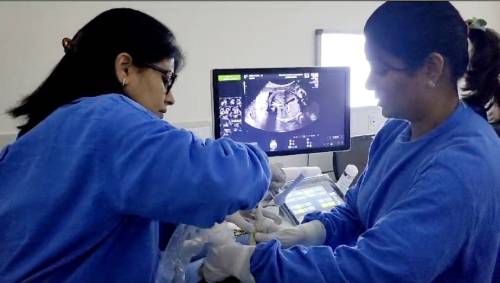
Intrauterine transfusion fulfills woman's dream of becoming a mother
Seema Yadav's excitement at becoming a mother for the second time after experiencing a miscarriage during her second pregnancy knew no bounds. The diligent efforts of the gynecologists and other healthcare professionals at Noida's Kailash Hospital, who made sure that she gave birth to a healthy baby, may have made this possible.
For the doctors and the mother, the nine-month period was difficult and challenging. She met the doctors at twenty sixth week of pregancy.
The mother suffered from a disorder known as Rh Isoimmunization, which caused the unborn child to develop anemia while still in the mother's womb. She miscarried during her second pregnancy as a result of receiving the Rh immunization. A fetus affected by this develops anemia.
The mother became anxious and wondered if she would become a mother again. But it was during her third pregnancy that she first encountered the Kailash Hospitals' medical staff.
Her illness was identified, and the physicians gave her the all-clear and informed her of the life-saving intrauterine transfusion (IUT) treatment. The IUT procedure involves giving blood to the developing child within the mother's womb.
This is done by inserting a needle through the mother’s abdomen into her womb, into the unborn baby’s umbilical cord and blood is pushed through that needle into the baby. RhIsoimmunization is a condition that develops in mothers with Rh negative blood group, who develop antibodies against Rh antigen.
Rh factor isa protein that is present on the surface of red cells in the blood. Women, whodo not have Rh factor, have Rh negative blood group. This Condition develops in those Rh negative mothers who carry Rh positive babies,which happens when their husbands are Rh positive.
Doctors said that usually, mother’s and unborn babies’ blood do not mix. But in situations like delivery, abortion, bleeding during pregnancy, unborn babies’ blood canenter the mother's blood. When Rh positive red cells enter the blood circulation ofRh-negative mothers, the mother’s immune system recognizes Rh positive red cells as foreign like viruses and develop antibodies against them.
This Condition is called Rh isoimmunization and mothers are Rh Isoimmunized. When the first pregnancy is unaffected, these antibodies in the subsequent pregnancy cross the placenta. If the unborn baby in the womb has Rh positive blood group, then,these antibodies destroy Rh positive red cells. If Destruction goes beyond a limit, then the unborn baby develops anemia. If anemia is not addressed, then it leads to heart failure and eventually can die. Timely Detection and intervention are critical to avert such dire consequences. Rh Isoimmunization is detected by means of a blood test called ICT (IndirectCoombs Test).
If they areICT positive, then they need to be referred to a specialized Fetal Medicine Unitfor counselling, follow ups and if required to conduct intrauterine transfusion. In the case of Mrs. Seema Yadav, Rh isoimmunization was the challenging scenario and the critical diagnosis prompted immediate action. Under the skillful guidance of Fetal Medicine Consultants, Dr. Neha Gupta and Dr. Pratima Das, Mrs. Seema Yadav underwent intra-uterine transfusion in the Department ofFetal Medicine, Kailash Hospital.
Three IUTs were given to the baby inside themother’s womb. This significant procedure made it possible to prolong the pregnancy from 26 weeks to 34 weeks and delivery was done at 34 weeks. After Delivery, the baby received an exchange transfusion and IVIg in the NeonatalIntensive Care Unit (NICU). The baby was discharged on day 5 of the life in a healthy condition.